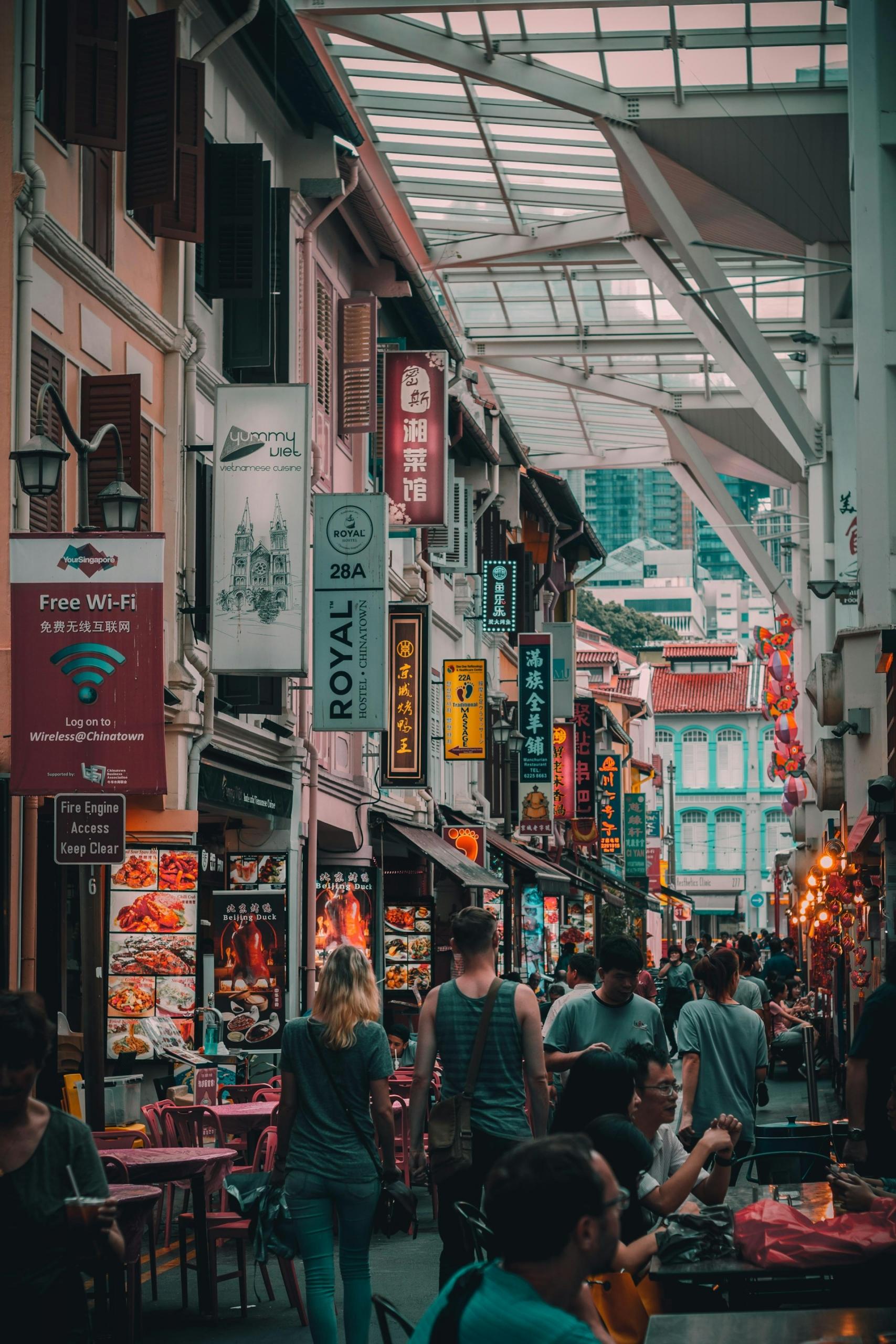If you care too much about Singapore, first it'll break your spirit, and finally, it will break your heart.
Alfian Sa'at, Singaporean writer
How Mr Sa'at came to this conclusion is uncertain. However, studying this island nation's long and often violent history, it's easy to believe his words. The country's official records, the Malay Annals, lists Singapore as a trading port as far back as the 13th Century. All of this commerce led to much instability.
And lots of external influence, both from Asian and European nations. All of them helped to shape Singaporean language, but the British had the greatest impact. This article traces Singapore English roots, and how it evolved into Singlish.

🇸🇬 How Singapore English Came to Be

This article's introduction hints at a long Singaporean history, throughout which dialects from around the world became a part of this tongue. Detailing those exploits demands hours of reading.
To keep things simple, let's summarise by pointing to Malay, Mandarin, Tamil, Hokkien, and English as this language's greatest influences.
English was one of the last languages to appear on the Singaporean language landscape. The British made port there in the early 19th Century. They immediately saw the value of this trading outpost and made arrangements with the Dutch, who controlled the Strait of Malacca. Then, they set up commercial relations with the Singaporean leadership, which led to colonisation.
The British ruled over Singapore for 154 years, from 1821 to 1965.
For that period, things remained calm in Singapore, even through the First World War. The British nevertheless built a large naval port to defend their colony. The defence plan fell through during the Second War. The British fleet had to defend territories closer to home.
Singaporean leadership fought to break away from British rule in the war's aftermath. Britain finally granted Singapore self-rule (1956), and full independence in 1965.
One might think that the colonisers' lack of care would have turned Singaporeans away from all things British. However, much like Jamaican English, Singaporean English was too large a part of society and government. The English language stayed, and took on a life of its own.
What Is Singaporean Language?
Around the world, language is a part of the culture it represents. Every culture has aspects that don't feature in other cultures. For instance, Nigeria permits multiple marriages. Thus, Nigerian English has words to describe this social situation - but British English does not.
The Singaporean language is no different, in that regard. Still, it doesn't stray very far from British English, either in vocabulary or grammar. Any aspiring politician, television presenter, teacher or doctor must speak as 'pure' a form of British English as possible.
Tamil, Malay, Mandarin and English are all co-official languages of Singapore.
Most countries have degrees of social levels; this nation does, too. Doctors, presenters, and politicians speak Standard British English (SBE); one social level down bends SBE standards. Their speech patterns leave off articles, and often don't conjugate verbs.
Post-creole language levels are called Acrolect, Mesolect, and Basilect. The latter represents Singlish.
Singapore English Versus Singlish
It would be hard to argue against British English being formal and, at times, complicated. By contrast, Singlish strives to be as simple as possible. First, it does away with articles and most other grammar rules. Then, it mixes in words from its other languages - Malay, Chinese, Tamil, and so on.
Means a mixture of different elements, randomly chosen and/or assigned.
Chapalang comes from the Hokkien dialect - one of the many that help shape Singlish. This word defines perfectly the spirit of the Singapore language.
You might argue that borrowing random words from several different languages is the very opposite of 'simple'. We wouldn't agree with you on that point. Our Australian English dialect includes words from French, German, and Indigenous Australians.
The trick lies in grammatical simplification. We make other languages' words fit our grammar. Singlish does away with grammar, so that every word fits. Let's see how that works.
Singlish Words to Know
We'd be hard-pressed to include a full Singlish dictionary in this chapter. So, we must limit ourselves to the ones people use the most. Just like a trying to choose a few Indian English words, these words are too delightful to limit oneself.
Many Singlish words come from the Hokkien language. This Mandarin dialect has its roots in China's Fujian province, a major centre for trade and migration. Thus, Hokkien-based Chinese language is one of the most common overseas varieties. Quiz yourself on these Singlish words before reading on.
Ang moh
This is one of the most important words new Singlish learners should know. It means 'red hair' in its original form. But its definition has grown. It now identifies all foreigners, regardless of their hair colour.
Alamak
Next time you need to toss out a curse word because something went wrong, try this word, instead. Alamak shows despair, shock, or surprise. "Alamak! I left meat on grill!" - such a situation is surely worthy of a heartfelt 'alamak'.
Chiong
English vernacular tends to take a military approach to everything. One must 'attack' a task to get it done, or 'charge forward' through unpleasantness. By contrast, this word gives the impression of a knife cutting through soft butter. It means 'hurry up!', as in: "You still do homework, chiong all the way!"
Goondu
You might imagine this word is not pleasant just by the way it sounds. Singlish speakers use it to describe a person who's not very bright. "Don't ask him for help, he's a goondu!" The word combines 'nut' and 'heavy' (Malay and Tamil words, respectively), to get its meaning.
Kiasu
This Hokkien word translates to 'afraid of losing out'. It suggests a rude person, behaving badly. "Kiasu man, rushing for food!" likely describes a person jumping the queue for the best food morsels.
At this point, we must note that Singlish is changing thanks to social media, like many other English dialects. The concept 'kiasu' expresses is a lot like FOMO - 'fear of missing out', a more popular expression. Only time will tell if one will replace the other.
Singlish Sentence Modifiers
These particles help Singlish speakers express emotion and intent. They tipically come at the end of a sentence, effectively punctuating it. The top three are the most-oft used ones.
Leh
used to show uncertainty - "It works leh?"
Lah
shows frustration or disgust - "Go faster, lah!"
Meh
express disbelief, rather like the English 'really?'
Lor
- acceptance, as in something you must do.
Ah
- a questioning tone.
Siah
- to give a whiny or bored tone
Singlish Idioms and Phrases
In 2000, the Singapore government launched an initiative to encourage grammatically correct English speech. They called it the Speak Good English Movement. Citizens moved in the other direction.
Singaporeans consider Singlish an important part of their identity. It is, after all, the language they're building. The government ended up toning down their Standard English campaign. These days, they "recognise the existence of Singlish as a cultural marker for many Singaporeans."

You'd be hard-pressed to find such delightful phrases in American English - or any other English dialect, as in Singlish. Try a few of these phrases on your friends, next time you get together. See if they aren't as tickled as you are about Singlish.
Agak agak
This phrase represents an estimate; Singlish speakers use it when they're not sure of exact amounts. "Four for dinner, how much rice to cook?" An 'Agak agak!' response means 'make your best guess!'. Note: the K on the end is silent; pronounce it 'ah-gah'.
Kan cheong
If you have an important deadline looming or maybe an exam coming up, you might feel nervous and upset. Your Singaporean friend might ask, "The exam is next week, why so kan cheong for what?". Translation: they wonder why you're nervous.
Act blur
On its own, 'blur' means 'ignorant', 'unaware', and/or 'confused'. You may double the 'blur', or combine it with 'sotong' to give it extra punch. "You so blur-blur!" is a grave insult, indeed!
When someone 'act blur', they're trying to play the innocent. "I know you took my hairbrush, don't act blur!" should set them straight.
Buay sai and Buay tahan
On its own, buay is saying no to something. Buay sai means you can't do what's being asked. For instance, if your mates ask you for a night out, you can tell them: "Buay sai, I must study for exams."
Buay tahan means you can't stand something. "I buay tahan that teacher!" is something students often say when they get a bad mark. Or maybe if the teacher assigns too much homework.
Steady pom pee pee
This expression is so much more fun than 'Well done!', for all that it means the same thing. It's something you might say to a workmate who did a good job, or a child who aced an exam. "You study steady pom pee pee!" has such an enthusiastic ring, much like phrases from the Irish English dialect!
Summarise with AI:















